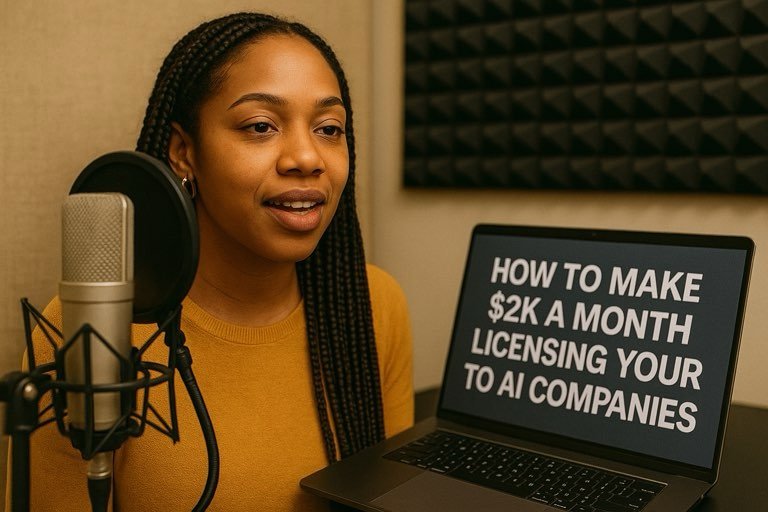What Does It Mean to License Your Voice?
Licensing your voice means you give AI companies permission to use your recorded voice data to train their text-to-speech (TTS) systems. Your recordings are turned into a “voice model” that can speak any text input. Companies then pay you for the right to use this model in their products or services.
Why AI Companies Pay for Voices
AI-driven voice technology is booming. From virtual assistants and audiobooks to chatbots and e-learning platforms, businesses need realistic, high-quality voices. While some rely on synthetic or fully AI-generated voices, many prefer the warmth and authenticity of a real human voice as their base.
How You Get Paid
- Flat Fee: A one-time payment for a set of recordings.
- Royalties: A percentage of revenue whenever your voice is used.
- Monthly Licensing Fee: Ongoing income as long as the company uses your voice.
Many voice licensors combine upfront payments with royalties for long-term income.
Skills and Equipment You Need
- Clear speaking voice with good pronunciation
- Ability to follow scripts precisely
- A quiet recording space
- Professional microphone (USB or XLR)
- Audio recording software (Audacity, Adobe Audition, etc.)
Step-by-Step Guide to Licensing Your Voice
- Identify AI Voice Platforms: Research companies like ElevenLabs, Descript, Resemble AI, and WellSaid Labs.
- Create a Voice Portfolio: Record various scripts—narration, conversational dialogue, and emotional tones.
- Apply or Pitch: Submit your recordings to AI companies or list your services on voice marketplaces.
- Negotiate Terms: Decide if you want upfront payment, royalties, or both.
- Record for Training: Complete the company’s required recording hours to train the AI model.
- Review and Approve: Ensure the AI-generated version of your voice meets quality standards.
How Much Can You Earn?
Income varies depending on usage rights and demand:
- Small Projects: $300–$800 flat fee
- Mid-Size Platforms: $1,000–$2,500 for licensing
- Royalties: Ongoing income that can exceed $2,000/month for popular voices
The more versatile and in-demand your voice, the more you can charge.
Tips for Success
- Offer multiple tones and styles to widen your appeal.
- Protect your rights with a clear licensing agreement.
- Keep your voice model updated with new recordings.
- Network with content creators who need unique voices.
Potential Risks
- Loss of control over how your voice is used if contracts are vague.
- Market saturation as more people join the field.
- Ethical concerns about deepfake misuse (make sure your contract includes protections).
Where to Find Opportunities
- AI voice startups and labs
- Voice acting job boards
- Freelance marketplaces
- Direct outreach to audiobook and e-learning companies
Final Thoughts
Licensing your voice to AI companies is one of the newest ways to earn passive income in the digital economy. With the right approach, you can create a long-term income stream from something as personal and unique as your voice. Like any business, success depends on quality, negotiation, and finding the right partners—but once your voice model is live, you could be getting paid even while you sleep.


